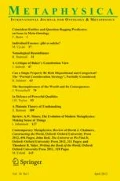Abstract
Russell’s critique of substance monism is an ideal starting point from which to understand some main concepts in Spinoza’s difficult metaphysics. This paper provides an in-depth examination of Spinoza’s proof that only one substance exists. On this basis, it rejects Russell’s interpretation of Spinoza’s theory of reality as founded upon the logical doctrine that all propositions consist of a predicate and a subject. An alternative interpretation is offered: Spinoza’s substance is not a bearer of properties, as Russell implied, but an eternally active, self-actualizing creative power. Eventually, Spinoza the Monist and Russell the Pluralist are at one in holding that process and activity rather than enduring things are the most fundamental realities.
Similar content being viewed by others
Notes
In what follows, the five books of the Ethics are numbered I to V. The abbreviations “p”, “a”, “d”, “c” and “s” stand for “Proposition,” “Axiom,” “Demonstration,” “Corollary” and “Scholium.”
Spinoza’s claim is stronger than this: Ip14 says that it is necessary that only one substance exists. The point is irrelevant for the purposes of the present article.
One important question remains open: how could the revisionary metaphysician ever hope to transcend the limitations of ordinary language without talking nonsense? This is a real difficulty, but it cannot be dealt with here at any length; cf. Simons (1998) for an insightful treatment of this issue.
It would closely resemble Leibniz’s universe, but the two worlds would not be identical: Leibniz’s spiritual monads are all of the same ontological type.
The one philosopher who has made the most to vindicate the process point of view in recent years is Nicholas Rescher, especially in Process Metaphysics (Rescher 1996). In this book Rescher provides a survey of great process thinkers of the past from Heraclitus to Whitehead, yet he does not mention either Russell or Spinoza. Quite different is his estimate of Leibniz (cf. also Rescher 2003).
References
Basile, P. (2010) Kant, Spinoza, and the metaphysics of the ontological proof. In: Metaphysica 11:17–37.
Bennett, J. (1984) A study of Spinoza’s ethics. Cambridge University Press. Cambridge.
Bennett, J. (1996) Spinoza’s metaphysics. In: Garrett, D. (ed.), The Cambridge companion to Spinoza. Cambridge University Press. Cambridge.
Curley, E. (1969) Spinoza’s metaphysics: an essay in interpretation. Harvard University Press. Cambridge, Mass.
Deveaux, S. (2007) The role of God in Spinoza’s metaphysics. Continuum. London.
Della Rocca, M. (2008) Spinoza. Routledge. London.
Doney, W. (1980) Spinoza’s ontological proof. In: Kennington, R. (ed.) The philosophy of Baruch Spinoza. The Catholic University of America Press. Washington, D.C.
Joachim, H. (1901) A study of the ethics of Spinoza. Clarendon Press. Oxford.
Leibniz, G. W. (1999) Sämtliche Schrifte und Briefe. Akademie Verlag. Berlin.
Marcus, R. B. (1993) Spinoza and the ontological proof. In: Modalities: philosophical essays. Oxford University Press. Oxford.
Nadler, S. (2006) Spinoza’s ethics: an introduction. Cambridge. Cambridge University Press.
Phemister, P. (2006) The rationalists: Descartes, Spinoza and Leibniz. Polity. Cambridge.
Rescher, N. (1996) Process metaphysics. An introduction to process philosophy. State University of New York Press. Albany.
Rescher, N. (2003) Process philosophy and monadological metaphysics. In: On Leibniz. Pittsburgh University Press. Pittsburgh: 232–241.
Russell, B. (1900) A critical exposition of the philosophy of Leibniz. George Allen & Unwin. London.
Russell, B. (1903) The principles of mathematics. George Allen & Unwin. London.
Russell, B. (1927a) An outline of philosophy. Unwin Books. London.
Russell, B. (1927b) The analysis of matter. Keegan Paul. London.
Russell, B. (1945) A history of Western philosophy. Simon and Schuster. New York.
Russell, B. (1956) Logical atomism. In: Logic and knowledge. Edited by Robert Charles Marsh. Routledge. London: 323–343.
Simons, P. (1998) Metaphysical systematics: a lesson from Whitehead. In: Erkenntnis, XLVIII: 377–93.
Spinoza, B. (1996) Ethics. Edited and translated by Edwin Curley. Penguin. London.
Sprigge, T.L.S. (2001) The mind of Spinoza’s God. In: Iyyun. The Jerusalem Philosophical Quarterly. 50: 253–272.
Sprigge, T.L.S (2006) The God of metaphysics. Clarendon Press. Oxford.
Whitehead, A. N. (1929) Process and reality: an essay in cosmology. Free Press. New York.
Whitehead, A. N. (1933) Adventures of ideas. Free Press. New York.
Wolfson, H. A. (1962) The philosophy of Spinoza: unfolding the latent process of his reasoning. Harvard University Press. Cambridge, Mass.
Acknowledgments
Thanks to Leemon McHenry for comments on a previous version of this paper.




